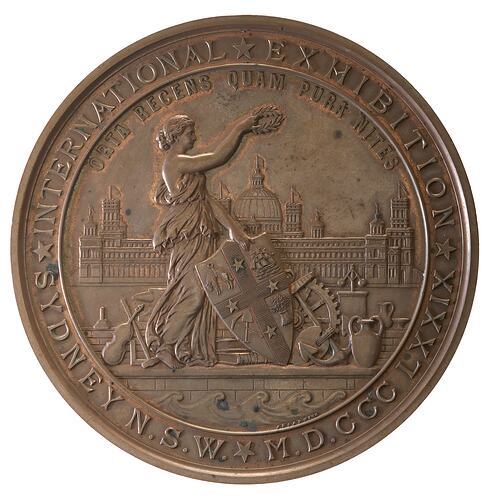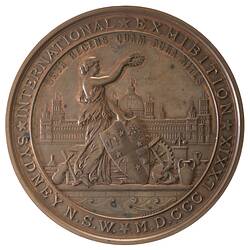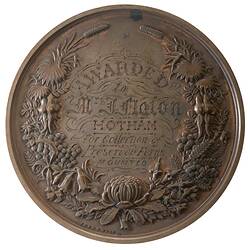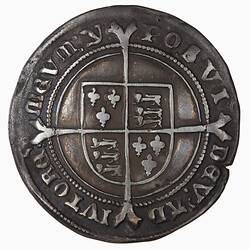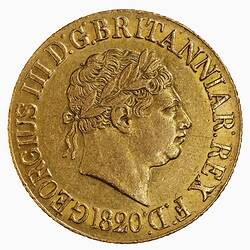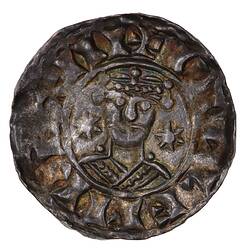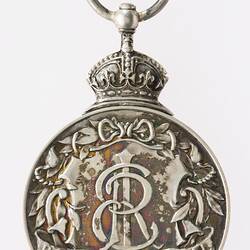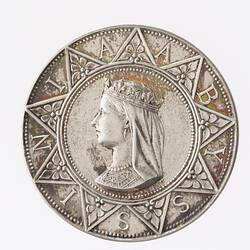Summary
Australia New South Wales Sydney
International Exhibition Prize 1879 - 1880 (AD)
Mint: Sydney
Awarded to: Mrs. Flaton of Hotham for mounted preserved ferns
Other Details: This large bronze prize medal (76 mm) featuring a view of the Sydney Garden Palace Exhibition Building with a figure of New South Wales was awarded to Mrs J. Flaton of Hotham for her collection of mounted, preserved ferns. Mrs Flaton's medal is detailed in the Official Record of the Sydney International Exhibition, 1879. Her entry consisted of a 'Basket of Flowers, formed of Seaweed, Coral, and Shells'. It received an honorable mention and was described as 'very tastefully arranged'. Joseph (and Mrs) Flaton lived at 26 Capel St, Hotham (now North Melbourne).The wreath of native flowers onthe reverse was designed by J.W. Sayer.
Physical Description
A large bronze prize medal (76 mm) featuring a view of the Sydney Garden Palace Exhibition Building with a figure of New South Wales standing in front holding the colonial shield and surrounded by exhibition goods.The reverse is inscribed with the name of the winner, Mrs. J. Flaton and a description of her entry, Preserved Ferns Mounted.
Obverse Description
Figure of New South Wales surrounded by works of industry before exhibition building; around, * INTERNATIONAL * EXHIBITION * SYDNEY N.S.W.* M.D.CCC.LXXIX in exergue, waves, below these waves in tiny letters the artists names, J.S. & A.B. WYON
Reverse Description
Wreath of Australian flora below in tiny letters, J.S. & A.B. WYON Inscribed, AWARDED / TO / MRS J.FLATON / HOTHAM / FOR COLLECTION OF / PRESERVED FERNS / MOUNTED
Edge Description
Plain
Significance
The Sydney International Exhibition was the first true international exhibition that an Australian colony had hosted. Previous exhibitions had been local or intercolonial. The International Exhibition was held in a purpose-built building at Inner Domain, featuring 15 acres of display area and a main dome 210 feet high. Four towers of this 'Garden Palace' provided spectacular views of the city and harbour, and the galleries were illuminated with stained glass skylights. The Exhibition was opened by His Excellency Lord Augustus Loftus on 17 September 1879, whose arrival in Sydney from England the previous month as the new Governor of New South Wales had been received with great enthusiasm. The Exhibition attracted over 1.1 million visitors, at a time when the population of New South Wales was 739,385. Awards for exhibitors were announced by the judges on the closing day, 20 April 1880. Gold, large silver, small silver and bronze medals and diplomas were awarded. The medal's obverse was based on a design by Samuel Begg and subsequently altered by J.S. and A.B. Wyon, who prepared the dies. The wreath of Australian flowers on the reverse was designed by James W. Sayers. The gold and silver medals were struck at the Sydney branch of the Royal Mint, and the bronze medals were struck in London. About 7,554 awards were made. The Garden Palace burned down in 1882. - Carlisle, Leslie J. 1978. Australia's First International Exhibition: Sydney 1879. Report of the Australian Numismatic Society. Yearbook No.3; Australian Dictionary of Biography. -D. Tout-Smith 11/11/2003.
The Sydney International Exhibition of 1879 included an extensive display of the handiwork of the children of NSW. This Sydney Juvenile Industrial Exhibition was organised by the Council of Education, with the schools of the colony contributing numerous exhibits, principally of crayon drawings, maps, illuminations and needlework. In all, the children won some six hundred awards, 'bearing testimony to the general merit of their handiwork' (from 'Official Record of the Sydney International Exhibition', 1881). -Powerhouse Museum web site http://www.phm.gov.au/scripts/webdbs/opac.idc?id=441. -D. Tout-Smith 20/10/2003.
More Information
-
Collecting Areas
-
Acquisition Information
Transfer from National Gallery of Victoria (NGV), R. V. Brown, 15 Mar 1976
-
Date Issued
1879 AD
-
Issued By
Australian International Exhibition Commissioners, Sydney, Greater Sydney, New South Wales, Australia, 1879-1880
-
Mint
-
Artist
Joseph S. Wyon, 23 Regent Street, London, England, Great Britain
-
Artist
-
Artist
-
Artist
-
Awarded To
Mrs Joseph Flaton, 26 Capel Street, Hotham (North Melbourne), Greater Melbourne, Victoria, Australia
-
Inscriptions
Obverse: *INTERNATIONAL* EXHIBITION * / SYDNEY N.S.W. * M.D.CCC LXXIX / ORTA RECENS QUAM PURA NITES / J.S. & A.B.WYON Reverse: AWARDED / TO / MRS J.FLATON / HOTHAM/FOR COLLECTION OF / PRESERVED FERNS / MOUNTED
-
Series
-
Material
Bronze
-
Axis
12
-
Classification
-
Category
-
Discipline
-
Type of item
-
Dimensions
76 mm (Outside Diameter)
Weight > 100 g.
-
Shape
Round
-
References
Hock.p.261 Jordan, Caroline and Filmer , Veronica, 'Old Sayer's Picture Gallery': James Whitley Sayer, Founder of the Geelong Gallery, Melbourne Art Journal, 11-12, 2008-2009, pp. 34-49.
[Article] Carlisle, Leslie J. 1978. Australia's First International Exhibition: Sydney 1879. Report of the Australian Numismatic Society. Yearbook No.3: 22-31.
[Book] Proudfoot, Peter, et al. 2000. Colonial City, Global City: Sydney's International Exhibition 1879.
[Book] 1881. Official Record of the Sydney International Exhibition, 1879. 1154.
-
Keywords
